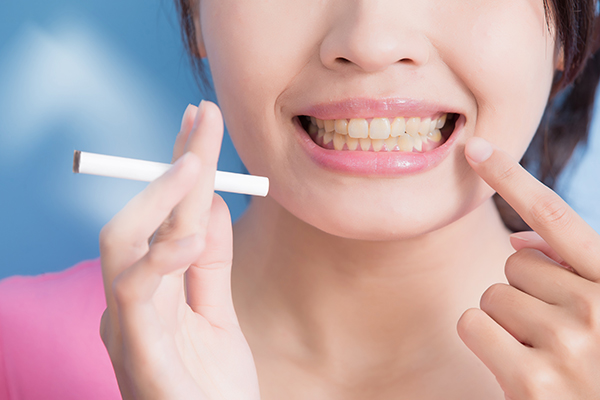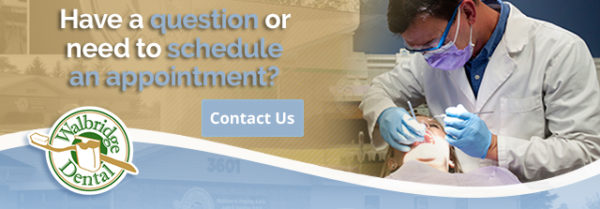
Everyone knows that smoking is bad for your health. But you may not appreciate exactly what smoking does to your teeth and gums and why it’s so detrimental for your long-term health! If you’re a smoker, or know someone who is, this information can hopefully be the deciding factor to help quit! It’s not easy, but the ramifications of frequent cigarette usage are so harmful that it’s well worth the effort.
Read on to learn more about what smoking does to your oral health and how it happens.
Cosmetic Issues
When looking at what smoking does to your teeth, the most glaring issues are often cosmetic. These effects are not only common, they’re almost impossible to avoid for even casual smokers:
Yellow Stains
Cigarettes contain nicotine and tar. These chemicals are not only bad for your health, but they also leave behind an impossible-to-miss yellow stain. It only takes a short time before cigarettes begin to leave this stain. With years of smoking, the stains can darken until they become brownish in color.
Bad Breath
Another trademark sign of a smoker is smoker’s breath. However, unlike yellow teeth, this isn’t exclusively due to the chemicals from cigarettes.
While the chemicals in cigarettes play a role, smoking also has some secondary effects that more directly cause halitosis. Consistent smoking will cause dry mouth, which creates an environment that’s ideal for bacteria and tartar to thrive.
That bacteria, combined with the lasting odors of chemicals from cigarettes, ultimately lead to very offensive breath.
Smoker’s Melanosis
The last major cosmetic issue is what’s known as smoker’s melanosis. This is a condition where the oral tissue, typically the gums, begin to develop a spotted brown or black pigmentation. The most common place to see it is the lower gums.
Tar and other toxic chemicals in smoking are the major causes of smoker’s melanosis. Their presence in the mouth of a smoker stimulates melanin-producing molecules to action, creating the mottled appearance.
While this is primarily a cosmetic issue, it can also impact those around the smoker. Children in households of frequent smokers can develop similar melanosis due to second-hand smoke.
Oral Health Effects of Smoking
What smoking does to your teeth is far more than simply cosmetic, however! There are minor and major health risks to your mouth directly caused by smoking. Additionally, the condition of your gums and teeth are worsened by smoking, which leaves them indirectly vulnerable to even more complications.
Tooth Decay – Due to dry mouth and other issues caused by smoking, your mouth becomes a breeding ground for bacteria, greatly increasing the rate of tooth decay. It’s common for long-term smokers to suffer from issues with losing teeth entirely!
Oral Cancer – Cancer is a common issue connected with smoking. In addition to lung cancer, oral cancers are prevalent among lifetime smokers.
Oral Thrush – Heavy smoking irritates oral tissue, which allows for yeast to grow and instigating the start of oral thrush.
Gum Disease – While gum disease is caused by a combination of many factors, smoking contributes to all of the major ones. It dries your mouth and irritates gum tissue while reducing your body’s ability to fight infections.
Bone Loss – Those who smoke are far more likely than those who don’t to experience bone loss in the jaw. This reduction of bone mass can have a domino effect on your oral and overall body health!
Why Does Smoking Cause Oral Health Issues?
There’s no denying that smoking is guaranteed to cause health issues. But you may be wondering why that is! There are dozens of factors that play into what smoking does to your teeth, gums and overall oral health, but the biggest one is how it impacts your immune system.
This one impact of smoking affects your whole body. Your gums are already susceptible to infections since your mouth always has bacteria in it. This is one of the reasons that brushing twice a day and flossing is so important.
Smoking stresses the immune system by constantly assaulting the body with chemicals. Ultimately, bacteria in your mouth will be more likely to survive and thrive, kickstarting the process towards periodontal disease, tooth decay and bone loss.
Can You Stop Smoking to Restore Your Oral Health?
Yes! The good news for smokers is that you can reverse much of the damage caused by smoking. Many of the effects of smoking are due to the ongoing issues from daily use. Once you reduce or quit smoking altogether, the impacts of smoking begin to subside.
Your immune system will become more effective, issues like dry mouth or infections are more likely to cease and your gums will be more resilient against the bacteria in your mouth.
Long-term damage linked to smoking like bone loss or tooth is permanent, but smoking cessation is absolutely the best thing you can do to prevent additional loss.
Contact Walbridge Dental
We can help make sure you and your family are brushing correctly. If you’re concerned or just looking for information, the professionals at Walbridge Dental provide complete family dental care to families in the Millbury community. Contact us online to set up an appointment now or call us at 419-836-1033.
Connect on Social Media!

